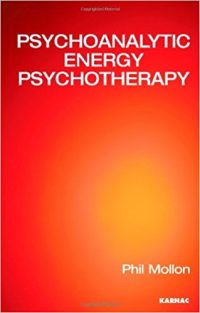People like to talk. We know that talking to an attentive and thoughtful listener can be helpful in clarifying conscious and unconscious feelings, thoughts, and motivations. But is talk enough? The complex physiology of anxiety and traumatic stress reactions is often stubbornly persistent, despite therapeutic exploration in both conscious and unconscious areas of the mind. In the case of severe trauma, talking can stir up the emotions and associated bodily disturbance without providing any resolution sometimes leaving clients feeling worse. The developing field of energy psychology offers an entirely new perspective and gamut of techniques for locating where these traumatic patterns are encoded. They are not in the mind but in the energy system at the interface of psyche and soma. By addressing these realms concurrently, a powerful therapeutic synergy emerges that allows rapid and deep shifts in the patterns of distress that drive the psychosomatic system. Psychoanalytic Energy Psychotherapy [PEP] provides a window into the deep sources and structures of emotional currents that flow through the mind. From the energetic vantage point, we can survey the parts, the multiple levels, and the hidden programmes of the psychosomatic system. We have access to realms that are not available through the psyche alone. The author has bridged the diverse fields of “thought field therapy” energy psychology and psychoanalysis to provide a novel overview that is both practical and theoretical. Contents: 1 – Introductory remarks 2 – The essence of energy psychology 3 – History: how did we get to energy psychology? 4 – Simple beginnings. EFT as a derivative of Thought Field Therapy 5 – Basic procedures in an energy psychology session 6 – Neurological (energetic) disorganisation 7 – Psychological reversal and associated resistances. 8 – Muscle testing (energy checking) 9 – Parts and programmes and other elements of the psychoenergetic system 10 – Energy toxins 11 – Working with the chakras 12 – Some thoughts on Tapas Acupressure Technique 13 – The energy perspective. How does it all work? 14 – Freud, Reich, and bioelectric energy 15 – Is the energy concept necessary? A cognitive model of Emotional Freedom Technique 16 – Energy psychology perspectives for borderline personality disorder 17 – The evidence base for energy psychology 18 – Case studies 19 – Ethical aspects of energy psychological work.
Psychoanalytic Energy Psychotherapy
Our Price: $59.52 (with free UK delivery)
Author: Phil Mollon
Publisher: Karnac Books
Published: 10/03/08
ISBN: 9781855755666

